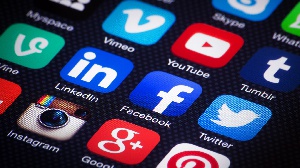The Alliance for Accountable Governance (AFAG) has condemned the Police Service for considering to ban social media on Election Day.
AFAG in a statement said “blocking or restricting access to social media is a blatant violation of freedom of expression. The 1992 constitution declares in no equivocal terms that: All persons shall have the right to freedom of speech and expression, which shall include freedom of the press and other media.”
The statement added: “The constitution guarantees that the press and every individual in Ghana has the right to say anything that they want, whenever that they want and wherever that they want.”
AFAG’s statement comes after the Inspector General of Police John Kudalor stated that the Ghana Police Service is considering closing down social media services during the November 7 general elections.
According to Kudalor, the move is to curtail abuse of the social media platforms where members of the general public hide behind them to create tension.
“At one stage I said that if it becomes critical on the eve and also on the Election Day, we shall block all social media as other countries have done. We’re thinking about it,” Kudalor told the media Thursday.
But AFAG says the position of the IGP in relation to the effect of social media on election suggests that the Ghana police lacks appreciation of the use of online social networking technology.
Below is the full statement
POLICE CANNOT GAG FREEDOM OF EXPRESSION
In 21st century Ghana where social media plays a key role in the advancement of our nation, it is surprising that an institution like the Ghana police service would ponder over a move that could possibly cause havoc and result in irreversible damages.
The Alliance for Accountable Governance is amazed at the stance of the Inspector General of Police, John Kudalor to consider shutting down social media sites across the country on Election Day.
The IGP’s worry is that social media could be used as a tool for misinformation thus posing a danger to the nation’s security during the polls. AFAG respectfully disagree with this opinion and we believe that this should not even be an option to consider at all.
To begin with, blocking or restricting access to social media is a blatant violation of freedom of expression.
The 1992 constitution declares in no equivocal terms that: All persons shall have the right to -freedom of speech and expression, which shall include freedom of the press and other media. The constitution guarantees that the press and every individual in Ghana has the right to say anything that they want, whenever that they want and wherever that they want.
Furthermore the Universal Declaration of Human Rights (UDHR) adopted by the United Nations General Assembly, and to which Ghana is a signatory, also states in Article 19 that: Everyone has the right to freedom of opinion and expression; this right includes freedom to hold opinions without interference and to seek, receive and impart information and ideas through any media and regardless of frontiers.
The position of the IGP in relation to the effect of social media on election suggests that the Ghana police lacks appreciation of the use of online social networking technology in a 21st century world as a platform of engagement.
Mr. John Kudalor must understand that social media have emerged as powerful tool to exchange information among a large variety of players, including the public, authorities (which obviously include the Ghana Police Service), Organizations and journalists.
AFAG finds it irritating that instead of the Ghana police to harness the power of the social media for superior surveillance and monitoring of hot-spots during the elections, they are rather contemplating shutting it down. This kind of thinking is unacceptable.
In 2008 and 2012, all the major stakeholders in Ghana’s political space actively engaged social media before, during and after the elections and this did not create any disturbance to the growth of our democracy. In fact, it allowed for a much stronger enjoyment of freedom of expression. The IGP should not contest this fundamental human right under the guise of ‘national security’.
AFAG believes that if the IGP’s concern is that that social media could be used as a tool for misinformation which may pose a danger to Ghana’s security during the elections, then this can be addressed by empowering institutions such as the NCCE, EC, security agencies and other stakeholders to launch an awareness campaign both on mainstream media and social media.
We call on all political parties, civil society groups, social media activists, journalists and all other stakeholders to sensitize their followers to be circumspect, decorous and empathic in their posts and comments on social media so as not to abuse the freedom of speech and expression.
AFAG Leadership
Politics of Friday, 27 May 2016
Source: starrfmonline.com

















